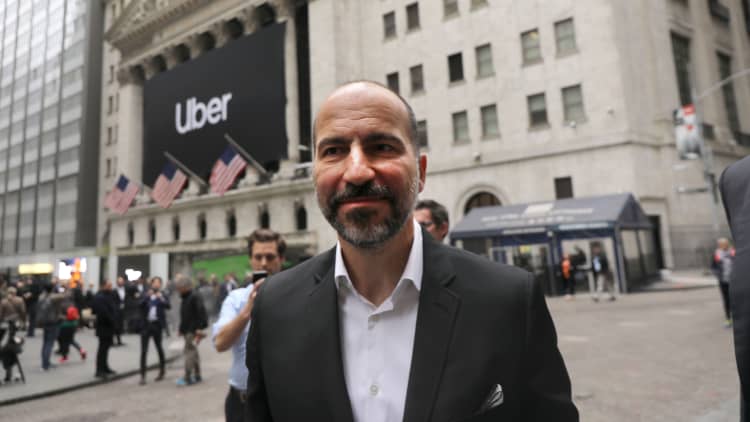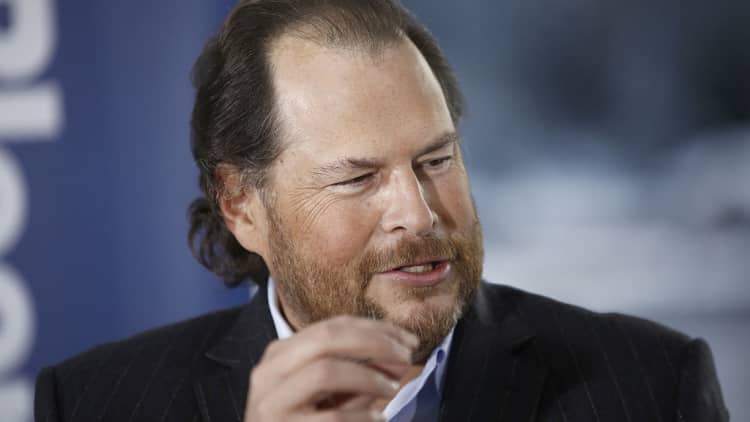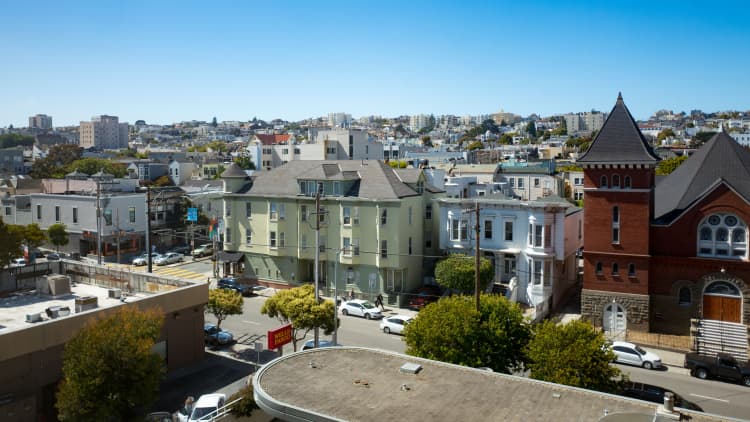Uber debuted below its IPO price on Friday and ended up down more than 7%, crawling across the finish line with a valuation below $80 billion.
That's a far cry from the $120 billion that was floated as recently as December. Founders and early investors are still going to get spectacularly rich, but late-comers and retail investors may find there's not much upside left unless the company can solve the quandary of serving a two-sided market profitably.
While disappointing for investors, Uber's debut may signal a welcome turning point for many in Silicon Valley. The Uber IPO caps an era characterized by big investments in relatively small ideas and an almost stubborn unwillingness to grapple with the larger challenges facing society and the world.
It kicked off around 2010 in the wake of the Great Recession, and has been fueled in part by a decade of record-low interest rates. As investors searched for ways to stay ahead of inflation, they poured money into the high-risk/high-reward venture capital sector, hoping for another Google or Facebook. Every time the venture capital industry seemed like it was about to slow down, another set of late entrants kept the party going — most recently, Masayoshi Son with the $100 billion SoftBank Vision Fund, funded in large part by Saudi money.
This ocean of venture capital was the backdrop to:
Highly funded start-ups that solved problems for wealthy young people inhabiting major cities. Uber and Lyft solved the problem of, "how do I get around without a car?" But there are many others tackling problems like "how do I eat now that I'm working all the time and never learned how to cook?" (food delivery, meal-kits); "how do I meet a potential partner?" (dating sites, Tinder); "how can I have more fun and save money on my vacations?" (Airbnb); "how do I find things to spend my disposable income on?" (flash-sale sites); "how do I get ideas for planning my wedding and setting up my home?" (Tinder, Instagram — which was bought by Facebook for $1 billion when it still had fewer than 20 employees). At their worst, the ideas were absurd, like a $700 juicer with packets of fruit that could be squeezed by hand.
Some of these companies had truly innovative ideas. They found real demand and served real needs. A lot of them were riding the rise of mobile computing, which combined always-on internet with location tracking and cameras to enable new scenarios. But they are a far cry from the Silicon Valley start-ups of yesteryear, which invented and enabled microprocessors, personal computers, the internet and mobile computing.

Delayed maturity. While many of these companies created real businesses with actual and growing revenues — something that many dot-com companies from the last boom of the 1990s lacked — almost none of them have generated consistent profits. This extends not only to the consumer start-ups mentioned earlier, but to most of the enterprise start-ups catering to businesses as well. (Videoconferencing company Zoom is a rare exception.)
Betting on growth over profits isn't necessarily a bad investment strategy — many successful tech giants today, including Amazon, Salesforce and Netflix lost money or had razor-thin margins for years. But many of the newer companies have not explained a clear path to sustained and profitable growth. It's also worth remembering that Microsoft, Apple, Google and Facebook all went public with profits.
Over the past seven years or so, venture capital has been so plentiful that today's generation of IPOs were able to stay private longer — Uber has been around for almost a decade -- forcing employees and early small investors to wait for liquidity and keeping retail investors from participating in the upside.
A profound lack of diversity, and the problems that come with it. Nearly all of the highly-funded start-ups of the Uber era were founded and led by a particular type of entrepreneur: white, male, from money, and educated at an elite private U.S. institution. These leaders often favored similar traits in their employees. This lack of diversity not only foreclosed opportunities for workers from different backgrounds, but almost certainly contributed to pervasive sexist and racist incidents in the industry. Uber's culture drew so many complaints that the company hired an independent investigator, and the results contributed to the ouster of Travis Kalanick, the CEO who oversaw most of the company's growth.
To be fair, these traits have been pervasive in the tech industry almost since it started, and it's not clear whether the current crop of start-ups is any worse than past generations, or whether more voices are calling attention to the disparity this time around.
An attitude of "ask forgiveness rather than permission." This famous adage, often attributed to Kalanick but actually dating back at least to early computer science pioneer Grace Hopper, was front and center at Uber and echoed by other companies of this era like Airbnb and scooter start-ups Bird and Lime. These companies believed that waiting for local governments to give them permission to operate would have stalled their growth, and they're probably right.
But in their rush to ignore regulators, they dismissed the idea that they might cause broader problems for the communities in which they operated. Uber and Lyft have made traffic worse in San Francisco, according to a recent study in Science, while reducing public transit ridership, according to a study by University of Kentucky researchers. Airbnb has taken housing stock off the market and arguably contributed to higher rents, according to a recent study by the Economic Policy Institute. Scooters littered the streets in San Francisco before the city banned all unlicensed ones, and are still piled up in public places in other cities like Santa Monica.
Visible representations of income inequality. Income inequality is a national problem, not specific to the tech industry or Silicon Valley. But expressions of this inequality in the area are particularly obvious. San Francisco housing has become nearly unaffordable while homelessness remains highly visible and seemingly unsolvable. "Gig economy" workers like ride-sharing drivers experience stagnant wages and minimal benefits while the tech workers they serve enjoy free gourmet meals at the office. Buses populate neighborhoods in the wee hours of the morning, picking up tech workers to deposit them miles away at Google or Facebook headquarters, while local public transit systems are underfunded and frequently broken down.

Where do we go from here?
The last couple years have shown some cause for hope.
The tech industry seems to be going through a phase of serious introspection. Multiple ex-Facebook insiders have criticized the company's dominance and business model. Tech leaders like Salesforce CEO Marc Benioff have started to talk about and fund solutions to societal problems like homelessness. Entrepreneurs, investors and academics are having substantive conversations about artificial intelligence and its possible effects on society now, while the technology is still in its early stages.
Employees at major tech companies like Google are pushing back against leadership decisions they don't agree with, like walking out over revelations that the company paid millions to executives accused of sexual improprieties and protesting the company's exploratory plans to build a censored search engine for China. It's gotten easier for companies with meaningful missions to recruit from the tech giants, as employees look for more than a paycheck.
Funding for gig-economy start-ups that serve mostly to replace the parents of young tech workers has faded, while more money has been flowing into start-ups trying to solve ambitious problems like fixing health care or revolutionizing agriculture.
Silicon Valley has been the most innovative place in U.S. industry for the better part of 70 years. That innovation can serve the broader needs of society, rather than existing in an isolated bubble apart from them. But only if the people participating in the industry want it to go that way.



